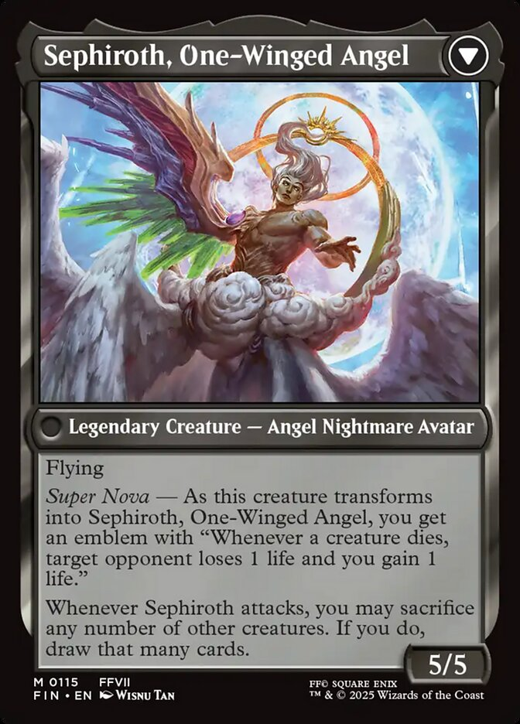This article requires a soundtrack.
Arguably the most famous character in the Final Fantasy franchise, Sephiroth, Fabled SOLDIER needed to have a combination of abilities that would do justice to his name, and Wizards delivered: the villain of Final Fantasy VII is the first creature in Magic history to create Emblems.
Let's not kid ourselves: at first glance when the previews began, Sephiroth seemed unimpressive: a glorified Blood Artist that had an extra ability and, like many cards in the set, some condition that seemed made for Commander, but the more I looked into possibilities for the card, the more I realized that it has inherent qualities for almost all competitive formats, be it in Midrange lists, or in Sacrifice variants, a theme where there are already archetypes predisposed to include Sephiroth in their lists due to the interactions it provides.
Sephiroth, Fabled SOLDIER - Review
First, we need to understand exactly what kind of archetypes benefit from Sephiroth.

In essence, the new card is a Blood Artist who enables itself every turn as long as we have a creature to sacrifice. He's both a threat and a card advantage in the same source as long as we respect what he needs to do, something that isn't a big challenge with the extensive card pools from both Standard and Pioneer.
Ad
What sets him apart from other cards in his category, however, is that Sephiroth counts any creature that died this turn for his second ability as well, leading him to some interactions with cheap removal, effects like Deadly Dispute and triggered or activated abilities of creatures that require sacrifice.

Two of them stand out in both formats: in Standard, the Mardu's Mobilize ability is the best possible support for Sephiroth in individual cards. The ability's trigger sacrifices the tokens at the end step, triggering both instances of the new card — if a Voice of Victory attacks alongside it, you can stack the triggers, create the two 1/1 tokens, sacrifice Voice of Victory to Sephiroth, and thus have three guaranteed triggers on the turn, with just a removal or other similar effect to transform him and create the emblem.
The same effect is possible with cards like Bloodtithe Harvester in Pioneer. By sacrificing it and dealing with an opponent's creature, that's two triggers on the stack, and we're one Fatal Push and one attack away from transforming Sephiroth and gaining the emblem, a relatively small effort for Midrange decks.
But is the other side really worth it?

Considering the above combination, the only advantage we get is that Sephiroth is attacking as a 5/5 Flying and creating an Emblem. Don't get us wrong: a creature creating Emblems is entirely new, and as we've seen with Kaito, Bane of Nightmares or Chandra, Awakened Inferno, these tend to stack and create severe problems for the opponent. However, it won't be enough for him to justify his slot in the Midrange lists.
In dedicated archetypes, on the other hand, Sephiroth's Emblem means that even if he is destroyed, there will be an untouchable clock on the board for every interaction you make — and these, by their very nature, already have a huge amount of creatures and interactions to make that emblem count.
Ad
Sephiroth in Standard
Without the Final Fantasy cards fully revealed yet, Sephiroth, Fabled SOLDIER already has a home in an archetype that does some good in ranked play and occasionally shows up in Challenges: Raise the Past.
This deck works by combining the effects of Vengeful Bloodwitch and Elas il-kor, Sadistic Pilgrim with Bartolomé Del Presídio and Zahur, Glory’s Past to create an “Aristocrats” archetype, where Raise the Past brings back all the creatures we sacrificed, allowing a new trigger sequence — an easy and effective home for Sephiroth.
But we tried something different in this version: I believe that decks like this will be the best home for Dark Confidant in the current Standard — its days in the Midrange are over, at least in this red-oriented Metagame — and it offers more breathing room and resources for the archetype while interacting with the main game plan, with the life loss being mitigated by Sephiroth and Vengeful Bloodwitch.

The second change involves the interaction we mentioned with the Mobilize ability. It is possible to further expand on this theme with Avenger of the Fallen, but just like Dark Confidant, Voice of Victory does something individually good, interacts with the rest of the deck, and is at the mana value we can recur with Raise the Past.
Interestingly, Sephiroth is the only card on the list that deviates from Raise the Past. But we can easily transform him, and from this point on, we can stack his ability with Raise the Past to generate so much card advantage that it makes it impossible for the opponent to get back into the game.
Ad
Sephiroth in Pioneer

Mayhem Devil is the greatest challenge for Sephiroth in Pioneer. There are circumstances where the new card is a better option: Devil has historically been the card that stops go-wide Aggro from spreading, while Sephiroth is potentially a better card when you need more card advantage in the long run and/or when gaining life from a resilient body is more important than controlling the board — perhaps the current Metagame is one of those cases.
The best Pioneer archetype right now is Mono Red Aggro, followed by Mono Black Midrange and Izzet Phoenix. In all three cases, you don't care as much about controlling the board with Mayhem Devil because the creatures have high toughness, their game plan doesn't involve going wide as efficiently, or they can play around with Prowess triggers, or, worst-case scenario, it's potentially bad to deal damage to them due to effects like Screaming Nemesis.
In these cases, Sephiroth becomes a better option, especially against Red Aggro who now have to deal with yet another means of holding their clock. For Midranges, the extra draw per attack provides more card advantage and can interact positively with other effects common to these archetypes, such as Claim the Firstborn, and the Emblem it creates when transformed sets up a win condition that the opponent cannot interact with.

There are downsides to making this trade as well. Mayhem Devil cares about any kind of sacrifice, which includes Witch’s Oven tokens or Fable of the Mirror-Breaker and Deadly Dispute treasures, as well as turning interactions with Cauldron Familiar into a Lightning Bolt for each iteration (one damage when activating Witch’s Oven, one when sacrificing the Food, and one from the Cauldron Familiar's ETB) compared to Sephiroth’s Shock, which forgoes the Food token trigger.
Ad
These interactions also allow for board control, which should not be neglected in the mirror or other creature-based archetypes, such as Dimir Ninjas (which might have gained a new tool with Ninja's Blades), Azorius Spirits and even against the same Red Aggro that Sephiroth is theoretically better at — it is always possible to play around a Prowess trigger and Mayhem Devil creates more openings for this by counting any sacrifice effects.
Perhaps Sephiroth's slot is in the lists that don't run red for Mayhem Devil. Some Golgari Food variants exist in Pioneer more focused on the interaction of Ygra, Eater of All with Cauldron Familiar. Despite this difference, I believe this is a good starting point for Sephiroth and perhaps a good place to start testing with Dark Confidant, since most mana values are low and there are many ways to mitigate the damage caused by it, in addition to several ways to sacrifice Confidant when he's no longer needed.

It is also possible to consider Rakdos versions running both cards as win conditions, but one of the biggest pulls to Sacrifice decks in Pioneer today is the combo-kill potential that Ygra, Eater of All offers, and giving it up in favor of a fairer variant may not offer the best results in the current Metagame, despite guaranteeing less reliance on the graveyard to win.
Wrapping Up
The biggest irony about Sephiroth, Fabled SOLDIER in this set is how he seems to be designed to interact with Aerith Gainsborough.

Ad
Someone on the design team certainly has a twisted sense of humor.
His abilities in Standard have enormous potential. It wouldn't be surprising if he somehow became the most relevant Final Fantasy card in the format and created a deck of its own around his synergies. In Pioneer, Mayhem Devil offers some major competition, and while each has its advantages and disadvantages, it's difficult to imagine him as a direct replacement under many circumstances.
Thanks for reading!








— Comentarios
0Se el primero en comentar